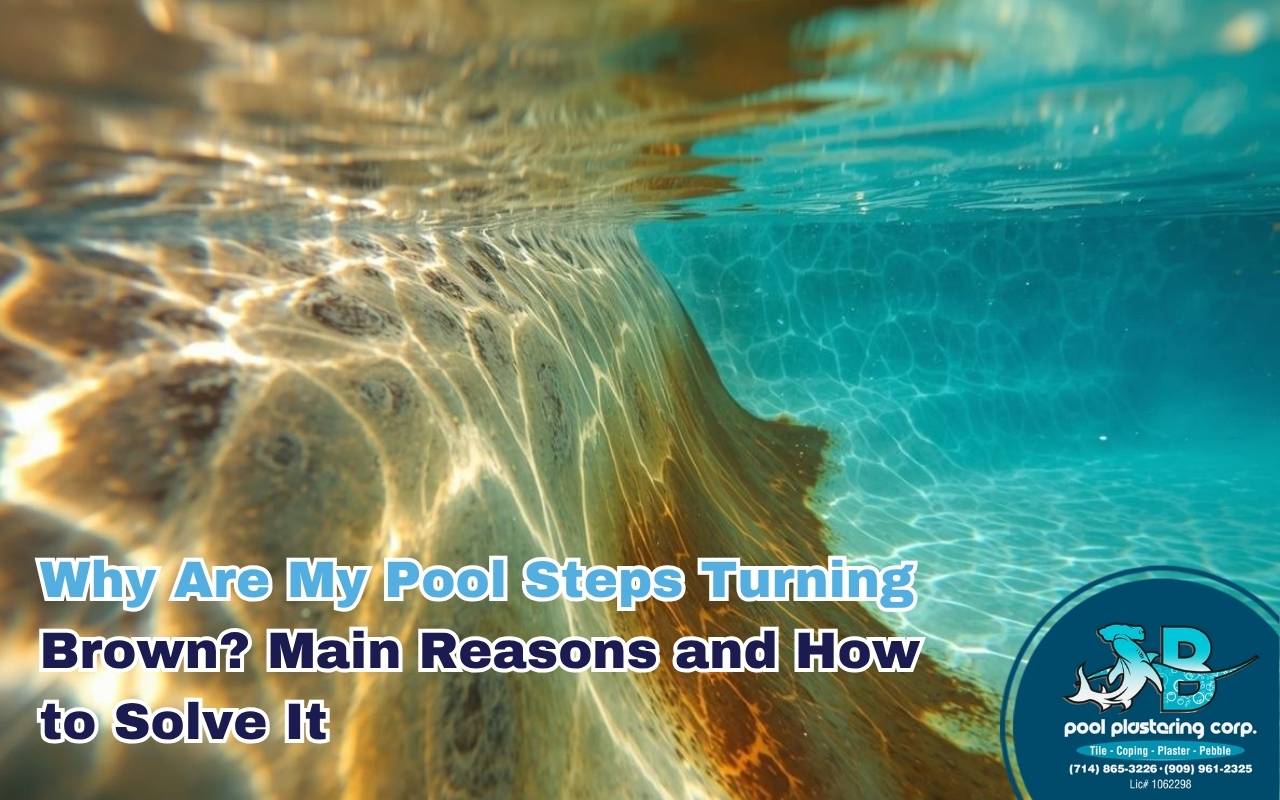
Why Are My Pool Steps Turning Brown?
Over time, noticing your pool steps turning brown can be worrying. These brown stains indicate underlying issues with water chemistry or metal buildup. Understanding the root causes and applying the right treatment ensures your pool stays clear, safe and attractive without costly repairs or replacements.
Why Are My Pool Steps Turning Brown and How Can I Fix Them?
Brown stains on pool steps usually result from metal oxidation, unbalanced chemistry, or algae buildup. Identifying whether the cause is iron, copper, or organic debris is key. By testing and adjusting water balance, using ascorbic acid or sequestrants, and maintaining preventive routines, you can keep your pool steps clear and free from recurring brown discoloration.
Main Causes of Brown Pool Stains
- Metal oxidation (iron, copper, manganese) creating rusty-brown discoloration.
- Algae or organic debris collecting on steps and stair edges.
- Unbalanced water chemistry (pH, alkalinity) allowing metals to deposit on surfaces.
- Corrosion of metal fixtures (ladders, handrails) introducing metals into pool water.
Even if you maintain your pool regularly, when you have pool steps turning brown it often means something in the system needs adjusting.
How to Diagnose Brown Stains on Pool Steps
- Test pH (aim 7.2-7.6) and alkalinity (80-120 ppm) weekly.
- Test for metal content in your water (iron, copper, manganese).
- Inspect metal parts (ladders, heaters) for signs of rust or corrosion.
- Use the vitamin C/ascorbic acid test: placing a tablet on the stain and seeing if it lightens helps identify metal stains.
How to Remove and Prevent Brown Pool Stains
Ascorbic Acid Treatment
- Dissolve ascorbic acid (vitamin C) in bucket, then apply around stained steps.
- Brush gently, let sit 15-30 minutes, then vacuum thoroughly.
- Effective for light metal stains while being gentle on surfaces.
Citric Acid Treatment
- Use citric acid for more stubborn metal stains: follow manufacturer dosage carefully.
- Scrub, let sit 30-60 minutes, then rebalance pool chemistry.
Metal Sequestrant Dosing
- Add a metal sequestrant weekly or after heavy rain/refill to bind metals and keep them dissolved.
- Maintain proper pH and alkalinity for best effect.
Surface-Specific Cleaning
- For plaster or concrete: Use a wet pumice stone gently on stained areas—only where safe.
- For vinyl or fiberglass: Use a non-abrasive pad/mild cleaner to avoid scratching the surface.
Frequently Asked Questions
What causes brown stains in pool steps?
The primary causes are metal oxidation (especially iron) that deposits on surfaces, algae/organic buildup, or water chemistry imbalance allowing those issues to occur.
Are brown stains harmful to swimmers?
Often the stains themselves aren’t directly harmful, but they signal water-quality issues (metals, imbalanced chemistry) that can affect corrosion or filtration. Fixing them improves safety and aesthetics.
Can I prevent stains without using harsh chemicals?
Yes. Maintenance like brushing, keeping chemistry balanced, and using sequestrants regularly helps prevent pool steps stained brown without resorting constantly to strong acid treatments.
Will ascorbic acid damage my pool surface?
Used correctly, ascorbic acid is a mild and safe treatment for metal stains on plaster, vinyl or fiberglass surfaces. It’s less harsh than many chemical treatments.
When should I call a professional?
If stains persist after multiple treatments, the metal source may be internal (e.g., corroded plumbing or heater) and a pro with water testing and repair capability may be needed.
Preventive Maintenance – How-To: Keep Pool Steps From Turning Brown
- Test and adjust pH & alkalinity weekly.
- Use a metal sequestrant after each shock or major water addition.
- Brush steps and stair edges frequently to avoid algae buildup.
- Inspect metal fixtures regularly for corrosion and replace rusted parts.
- Filter new fill water (if from well) or use hose pre-filter to reduce metal load.




